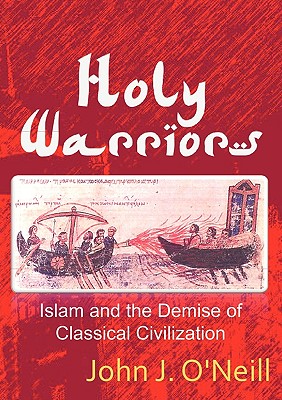Holy Warriors

Holy Warriors
One of the most enduring problems of history is the decline of Classical Civilization. How was it that the civilization of Greece and Rome, which had endured almost a thousand years, a civilization which prized learning, science and reason, gave way to the world of the Medieval; an age which saw, for a while, the almost complete disappearance of the rationalist spirit of Greece and Rome? The traditional view was that after their seizure of Italy in the fifth century, the Barbarian tribes of Germany and Scythia had reduced Europe to an economic and cultural wasteland, initiating a Dark Age, which was to last half a millennium. After the Reformation, another suspect was added to the list: Christianity, or, more accurately, Catholic Christianity. In this view Christianity was corrupted beyond recognition after the time of Constantine and from the fourth century onwards a power-hungry Church hierarchy, in cahoots with the Imperial authorities, kept the population of Europe in subservience and ignorance, effectively completing the destructive work of the Barbarians. In this ground-breaking work, historian John J. O'Neill examines a great variety of evidence from many specialties and reaches an astonishing and novel conclusion: Classical Civilization was not destroyed by Barbarians or by Christians. It survived intact into the early seventh century. The Vandals and Goths who seized the Western Empire in the fifth century had become completely romanized by the start of the sixth century. Artistic and intellectual life flourished, as did the economy and the cities built earlier under the Empire. Yet sometime in the middle of the seventh century everything changed. Cities were abandoned, literacy plummeted, royal authority declined and local strongmen, or "barons", seized control of the provinces. The Middle Ages had begun. Who or what had caused this? As O'Neill notes, by the 1920s Belgian historian Henri Pirenne had located the proverbial "smoking gun"; but it was not in the hands of the Barbarians or the Christians: it was held by those who, even then, it had become fashionable to credit with saving, rather than destroying, Classical Civilization: the Arabs. In a concl
PRP: 232.04 Lei
Acesta este Prețul Recomandat de Producător. Prețul de vânzare al produsului este afișat mai jos.
208.84Lei
208.84Lei
232.04 LeiLivrare in 2-4 saptamani
Descrierea produsului
One of the most enduring problems of history is the decline of Classical Civilization. How was it that the civilization of Greece and Rome, which had endured almost a thousand years, a civilization which prized learning, science and reason, gave way to the world of the Medieval; an age which saw, for a while, the almost complete disappearance of the rationalist spirit of Greece and Rome? The traditional view was that after their seizure of Italy in the fifth century, the Barbarian tribes of Germany and Scythia had reduced Europe to an economic and cultural wasteland, initiating a Dark Age, which was to last half a millennium. After the Reformation, another suspect was added to the list: Christianity, or, more accurately, Catholic Christianity. In this view Christianity was corrupted beyond recognition after the time of Constantine and from the fourth century onwards a power-hungry Church hierarchy, in cahoots with the Imperial authorities, kept the population of Europe in subservience and ignorance, effectively completing the destructive work of the Barbarians. In this ground-breaking work, historian John J. O'Neill examines a great variety of evidence from many specialties and reaches an astonishing and novel conclusion: Classical Civilization was not destroyed by Barbarians or by Christians. It survived intact into the early seventh century. The Vandals and Goths who seized the Western Empire in the fifth century had become completely romanized by the start of the sixth century. Artistic and intellectual life flourished, as did the economy and the cities built earlier under the Empire. Yet sometime in the middle of the seventh century everything changed. Cities were abandoned, literacy plummeted, royal authority declined and local strongmen, or "barons", seized control of the provinces. The Middle Ages had begun. Who or what had caused this? As O'Neill notes, by the 1920s Belgian historian Henri Pirenne had located the proverbial "smoking gun"; but it was not in the hands of the Barbarians or the Christians: it was held by those who, even then, it had become fashionable to credit with saving, rather than destroying, Classical Civilization: the Arabs. In a concl
Detaliile produsului










